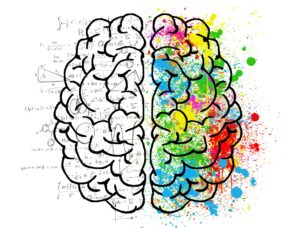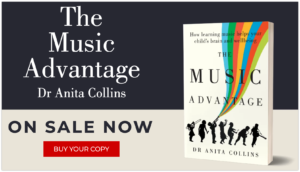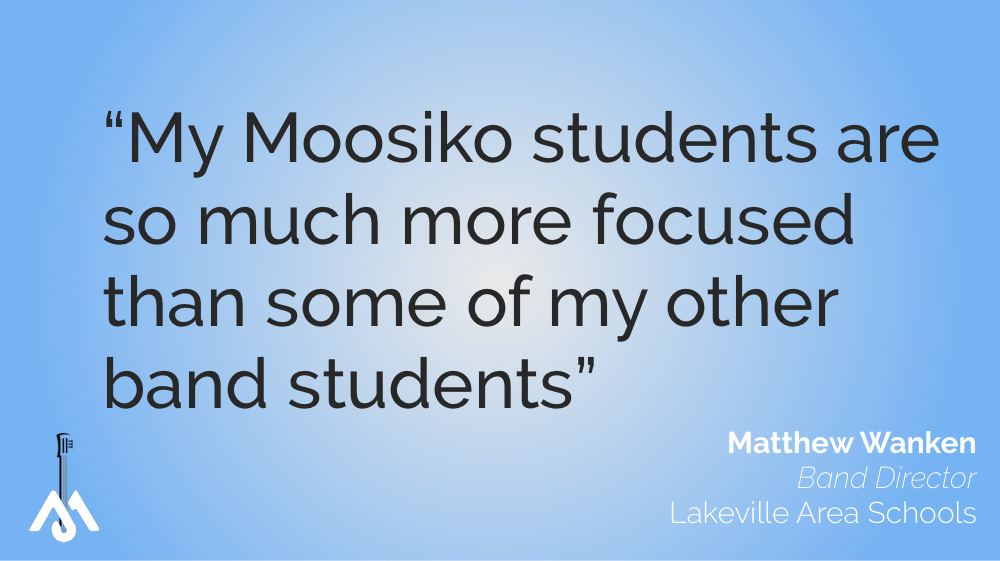I just finished reading The Music Advantage by Dr. Anita Collins. Dr. Collins is a leading neuromusical researcher studying the benefits that learning music has on growing children and adults. I first heard of her when her 2014 TEDx talk went viral and have been following her ever since. Moosiko has always tried to incorporate the latest musical research into our product and once again, The Music Advantage validates what we and many music educators already know: learning music gives students a cognitive advantage not just in school, but for the rest of their life.
If you’re interested in this topic, or looking for some evidence based research to expand the music program in your school, I encourage you to buy her book. Here is a short summary of her findings that I found most interesting.
What the heck is neuromusical research?
Neuromusical research is a fairly new study of music’s impact on neural development in the brain. This field is only about 30 years old, relatively new, because the invention of fMRI in the 1990s allowed researchers to more effectively study the brain in real time.
Auditory processing is really really important
- Your ears gather more information than any of your five senses. Yes, even more than your eyes.
- A newborn baby interprets the world 100% through sound for the first 6 months. Babies are born with a fully functioning auditory processing system. Sights, touch, smell, and taste take ~6 months to develop.
- Listening to music sets off neurological fireworks in the brain. Playing music is like the grand finale.
Your brain on music
- Your brain has an amazing ability to interpret both the individual components of music (beat, rhythm, melody, specific instruments) and the entire piece simultaneously.
- For toddlers, dancing while listening to music is how they learn fine motor skills
- A child struggling with learning will also struggle with keeping a steady beat (the book has some amazing examples of Dr. Collins diagnosing reading and vocabulary issues by simply watching kids clap)
Pay attention!
- Playing music helps kids pay attention because it activates all the senses at once. We design our step-by-step song lessons for this very purpose, to help students build their ‘focus muscle’. And our teachers definitely see a difference.
- Music teaches students to build inhibitory control because, well, music can be frustrating at times. But getting stuck, sticking with it, and figuring it out teaches persistence. We tune our adaptive learning engine so that students struggle just enough to learn persistence while not getting discouraged.
- Studies show that musically trained students have longer attention spans because they learn how to practice. (there are a lot of great tips and tricks on this in the book)
- Students that start learning music as teenagers benefit from better decision making ability later in life.
Reading and math comprehension get a boost with music
- Learning music wires your brain in such a way that actually makes learning to read easier. This is because music and language use an overlapping neural network. If you want to make learning to read easy for students, teach them music first.
- Repetition is vital when learning the visual/auditory connections of speech and reading. Deliberate practice and repetition is at the core of the Moosiko Method™.
- Music is pattern-based just like reading and math. Learning music teaches us to identify, understand, and predict patterns…probably one of life’s most valuable skills.
- For all these reasons, and more discussed in the book, music shouldn’t be categorized under performing arts anymore. It needs to be a core component in the language and math subject areas.
Teamwork and creativity
There are so many great examples of teamwork and creative accomplishments in music, these are just a few key takeaways.

- Music teaches teamwork
- Musicians have better memory storage and retrieval systems
- Musically trained students tend to have more strength in these two traits compared to non-musicians:
- Conscientiousness: self-discipline, organization, motivated by achievement
- Openness-to-new-experience: Imagination, intellectual curiosity, desire to be creative
Conclusion
Music provides so many benefits on learning and brain development no matter the age, sex, cultural background, or socioeconomic status of students. And Dr. Collins, among other neuromusical researchers, all feel we’re just seeing the tip of the iceberg on these benefits. We now have substantial evidence that learning an instrument will:
- Improve reading and math comprehension
- Increase attention span and ability to focus
- Boost confidence, ability to ‘stick with it’, persistence
- Improve cognitive abilities by roughly twice as much compared to sports, theatre, and dance
- Improve exam scores in science, math, and english giving students a 1 year advantage compared to non-musicians
Study after study shows that learning to play and read music is more than a performing art. It is a critical tool for cognitive, social, and creative development that doesn’t just help us ace our school exams, but positively impacts our brain and social development for our entire lives.
Buy a copy and let’s make music a more permanent part of the education system.


